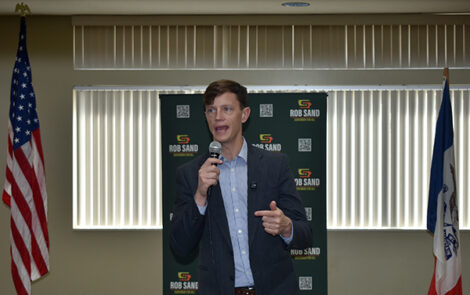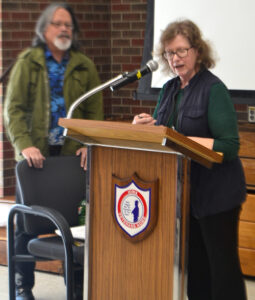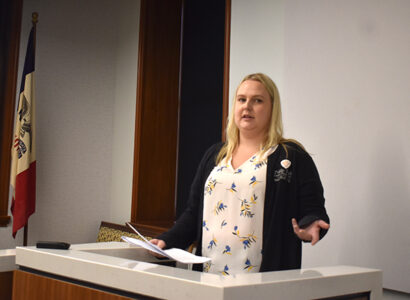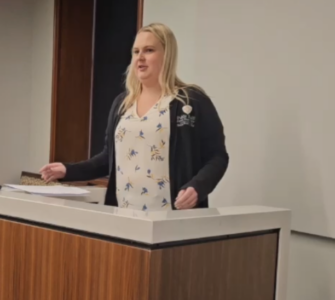County public health director: No definitive identification of Legionella source through testing thus far
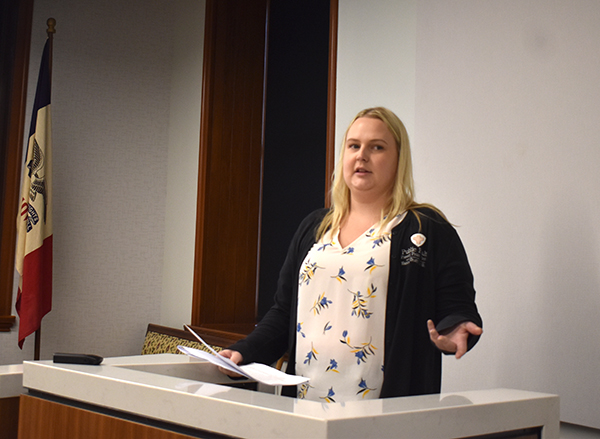
T-R PHOTO BY ROBERT MAHARRY — Marshall County Public Health Director Sydney Grewell provides an update on the Legionella outbreak to the Board of Supervisors during Wednesday morning’s meeting. No definitive source of the outbreak has been pinpointed thus far after the testing of 12 privately owned cooling towers in north central Marshalltown, and remediation efforts are ongoing.
Near the beginning of Wednesday morning’s Board of Supervisors meeting, Marshall County Public Health Director Sydney Grewell provided another update on the Legionellosis outbreak and the ongoing search for the source of the bacteria, which causes Legionnaires’ disease.
At the time of the meeting, there were 71 confirmed cases in Marshall County and two deaths, and the number increased to 73 by 3 p.m. on Wednesday according to the Iowa Department of Health and Human Services (HHS). The source of the outbreak is believed to be one of 12 privately owned cooling towers in north central Marshalltown — all of which have been tested for the Legionella bacteria. So far, there are no conclusive positive tests linking the outbreak to a specific source, and the locations of the towers in question have not been publicly disclosed.
“We are hopeful to see some growth in those towers, but the absence of growth can be expected with Legionella as testing negative doesn’t mean that those are in the clear. But remember that Legionella is a hard bacteria to grow and isolate,” she said.
The owners of all 12 of the towers have started the process of online disinfection, meaning that the systems are still running, and it allows them to continue using their units and treat them. They are also in the process of completing full offline remediation, a process that involves shutting down the system, taking it offline and performing a full cleaning.
“We have yet to have any of these business centers complete this step, as this step is crucial in ensuring that Legionella has been eliminated within the cooling towers,” Grewell said.
On Monday afternoon, Grewell and officials from Iowa HHS sent a letter to Marshalltown Mayor Joel Greer recommending that the upcoming Oktemberfest activities be moved away from the downtown area, which is considered to be within the north central Marshalltown “epicenter” of the outbreak. During a meeting the same night, the city council voted 4-3 to keep the festivities downtown and disregard the recommendation.
“Since we have not had any of those business centers fully complete the offline remediation, it was out of (an) abundance of caution that we recommended these festivities be moved,” Grewell said. “For those that live, work or visit the area, it’s likely that they have been exposed, so changing their daily routines wouldn’t have added much value. We understand that the parade and the activities might draw hundreds if not thousands of individuals to the area who may be at higher risk.”
Those who are 50 and older, have underlying conditions and/or a smoking history are considered to be at the highest risk of contracting the disease, which is transmitted through inhaling contaminated water droplets. Grewell recommended that they speak with their primary care providers before deciding on whether or not to attend the events.
A second death as a result of the outbreak occurred on Sept. 18 and was publicly reported on Monday, and Grewell said the individual had multiple underlying health conditions. All available evidence continues to point to the cooling towers as the most likely source, but she has been encouraged by what seems to be a plateau in case numbers in recent days. The numbers are reported daily on the Iowa HHS website at 3 p.m.
As she opened up the floor to questions, Supervisor Jarret Heil asked about the “mixed messaging” regarding Oktemberfest and why the recommendation to move the events was issued on Monday. Grewell said she met with city officials earlier last week to discuss the situation, and she hoped to see some of the business owners complete the offline remediation process by the weekend.
“Some of them have been dragging their feet, taking their time, which is not what we wanted to see. We did see those decreased cases over the weekend, which is important and fantastic to see, but again, out of (an) abundance of caution, we just didn’t want to expose some of those people with higher risk to the area,” she said. “Like I said, those who normally, like us, who work over here or just travel through the area for normal activities, come to get food on a regular basis, just visit the area, it’s likely that we’ve been exposed, and most of us won’t get sick from being down in this area.”
Heil also noted the recent plateau in cases and wondered about the likelihood of another spike in the days and weeks to come. Grewell responded that it is difficult to predict and cited the two to 14 day exposure period while also hoping that the numbers would continue to level off in the near future especially as the remediation processes are still in progress with a deadline being worked on with the state environmental health team and staff at the Iowa Department of Natural Resources (IDNR).
Supervisor Kevin Goodman asked if wearing masks helped to protect individuals from exposure and added that COVID-19 is also making a comeback at the moment.
“It’s high respiratory season in general, so there’s a lot of cases and flu season’s coming around. There’s a lot of rhinovirus and enterovirus going around as well, so the providers are also checking for those normal respiratory viruses as well,” Grewell said. “Some people are just wearing them out of caution if they feel sick, or they might be immunocompromised. Some people wear masks all year round. It just depends on the person, but again, it can’t be transmitted person to person. So you can’t cough, sneeze, wipe your snotty nose on somebody and give them Legionella. You have to inhale it through your nose, and it has to get in through your lungs and you have to breathe it through that contaminated aerosolized water.”
Board of Supervisors Chairwoman Carol Hibbs asked Grewell for clarification on the remediation, and she confirmed that not all of the businesses have completed commercial remediation. Grewell said all of the businesses have completed online remediation of their cooling towers, but the offline remediation is “more intense” and is handled by third-party companies that specialize in cleaning cooling towers — requiring the system to be taken offline, drained and cleaned before they are brought back online.
“That is the step that we are in the process of doing now. Again, people have been scheduled. They’re working on them this week, and we’re trying to get them a deadline of getting them done this week, especially before this weekend’s activities,” Grewell said.
Heil thanked Grewell for her hard work on the matter and hoped the plateau of new cases would continue while anticipating further updates that would be helpful both to the board and the public. In response to a follow-up email from the T-R later in the day, Grewell expounded on the reasons why business owners might be hesitant to complete the offline remediation process.
“In many cases, the companies they typically use for water management do not offer the full offline remediation process. As a result, these centers had to identify and engage another qualified provider, which caused delays. Additionally, due to the size and number of cooling towers at each site, offline remediation represents a significant financial undertaking. For some businesses, these costs must be escalated for approval within their chain of command, further slowing progress,” she said. “Another factor is that some business centers are reluctant to proceed with offline remediation after having already invested in online remediation. They are hesitant to allocate additional resources, especially when they believed the previous work had addressed the issue. These combined factors help explain why certain business centers have not yet completed the offline remediation process.”
——
Contact Robert Maharry
at 641-753-6611 ext. 255 or
rmaharry@timesrepublican.com.

